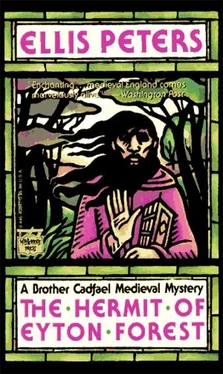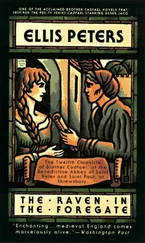Richard slackened his hold reluctantly, and raised a face smudged with mud and the green of leaves from his falls, the sweat of his haste and fear, and a few frantic tears of relief from a terror seen now to be none too reasonable. “Father, don’t let him take me! I don’t want to go back, I want to be here, I want to stay with Brother Paul, I want to learn. Don’t send me away! I never meant to stay away, never! I was on my way back when they stopped me. I was on my way home, truly I was!”
“It would seem,” said the abbot drily, “that there is some dispute here as to where your home is, since the lord Fulke is offering you safe-conduct there, whereas you are of the opinion that you are already arrived. What account you have to give of yourself can wait another occasion. Where you belong, it seems, cannot. Get up, Richard, at once, and stand erect as you should.” And he reached down a lean and muscular hand to take Richard by the forearm and hoist him briskly to his feet.
For the first time Richard looked about him, uncomfortably aware of many eyes upon him, and a little galled at having to cut so dishevelled and soiled a figure before all the assembled brothers, let alone the indignant shame he felt at the stiffening snail-trails of tears on his cheeks. He straightened his back, and scrubbed hurriedly with a sleeve at his dirty face. He looked briefly for Brother Paul among the habited circle, and found him, and was a little comforted. And Brother Paul, who had been hard put to it not to run to his strayed lamb, put his trust in Abbot Radulfus, and kept his mouth shut. “You have heard, sir,” said the abbot, “what Richard’s preference is. No doubt you know that his father placed him here in my care, and wished him to remain here and study until he came of age. I have a claim to the custody of this boy by charter, duly witnessed, and it was from my care he disappeared some days ago. I have not so far heard what substance there may be in your claim on him.”
“Richard changes his mind daily,” said Fulke, confidently loud, “for only last night he went willingly in quite another direction. Nor do I hold that such a child should be left to choose by his own liking, when his elders are better judges of what’s good for him. And as for my claim on the charge of him, you shall know it. Richard is my son by law, with his grandmother’s full knowledge and consent. Last night he was married to my daughter.” The shiver of consternation that went round the circle of awestricken watchers subsided into absolute stillness. Abbot Radulfus was not shaken outwardly, but Cadfael saw the lines of his gaunt face tighten, and knew that the shaft had gone home. Such a consummation had been plotted long since by Dionisia, this self-important neighbour was little more than her instrument in the affair. What he announced could very well be true, if they had had the boy in their hands all this time that he had been missing. And Richard, who had stiffened and jerked up his head, open-mouthed to cry that it was false, met the abbot’s stern eyes fixed steadily upon him, and was utterly confounded. He was afraid to lie to that judicial countenance, indeed he admired as much as he feared, and he did not wish to lie, and confronted with this flat declaration he found himself at a loss to know what was truth. For they had married him to Hiltrude, and simple denial was not enough. A last bolt of fright went through him and took his breath away, for how if Hyacinth was himself deceived, and the vows he had tamely repeated had bound him for life?
“Is this true, Richard?” asked Radulfus.
His voice was level and quiet, but in the circumstances seemed to Richard terrible. He gulped down words that would not do, and Fulke, impatient, answered for him: “It is true, and he cannot deny it. Do you doubt my word, my lord?”
“Silence!” said the abbot peremptorily, but still quietly. “I require Richard’s answer. Speak up, boy! Did this marriage indeed take place?”
“Yes, Father,” faltered Richard, “but it is not—”
“Where? With what other witnesses?”
“At Leighton, Father, last night, that is true, but still I am not—” He was cut off again, and submitted with a sob, frustrated and growing indignant.
“And you spoke the words of the sacrament freely, of your own will? You were not forced? Beaten? Threatened?”
“No, Father, not beaten, but I was afraid. They did so hammer at me—”
“He has been reasoned with, and he was persuaded,” said Fulke shortly. “Now he takes back what he granted yesterday. He spoke his part without hand being laid on him. Of his own will!”
“And your priest undertook this marriage willingly? Assured that the consent of both was freely given? A good man, of honest repute?”
“A man of known holiness, my lord abbot,” said Fulke triumphantly. “The country folk call him a saint. The holy hermit Cuthred!”
“But, Father,” Richard cried with the courage of desperation, determined to get out at last the plain, untangled truth of it, “I did what I did so that they’d let me go free, and I could get back to you. I did say the vows, but only because I knew they could not be binding. I am not married! It was not a marriage, because—” Both the abbot and Fulke broke into speech, sternly overriding his outburst and ordering his silence, but Richard’s blood was up. If it must out here before everyone, then it must. He clenched his fists, and shouted loudly enough to fetch a stony echo from the walls of the cloister: “—because Cuthred is not a priest!”
IN THE GENERAL RIPPLE AND STIR OF ASTONISHMENT, doubt and outrage that passed like a sudden gust of wind through the entire assembly, from Prior Robert’s indignant snort to the inquisitive and half-gleeful whisperings and shiftings among the novices, the thing that was clearest of all to Cadfael was that Fulke Astley stood utterly confounded. Never had he had the least notion what was coming, it had taken his breath away. He stood dangling his arms in curious helplessness, as though something of his own being had slipped from his grasp and left him lame and mute. When he had recovered breath enough to speak at all he said what would have been expected of him, but without the confidence of conviction, rather forcibly thrusting the very suggestion away from him in panic.
“My lord abbot, this is madness! The boy is lying. He’ll say anything to serve his turn. Of course Father Cuthred is a priest! The brothers of Savigny from Buildwas brought him to us, ask them, they have no doubts. There has never been any question. This is wickedness, so to slander a holy man.”
“Such slander would indeed be wickedness,” agreed Radulfus, fixing his deep-set eyes and lowered brows formidably upon Richard. “Think well, sir, before you repeat it. If this is a device to get your way and remain here with us, think better of it now and confess it. You shall not be punished for it. Whatever else, it would seem that you have been misused, abducted and intimidated, and that shall excuse you. I would remind Sir Fulke of these circumstances. But if you do not tell truth now, Richard, then you do incur punishment.”
“I have told truth,” said Richard stoutly, jutting his very respectable chin and meeting the awesome eyes without blinking. “I am telling truth. I swear it! I did what they demanded of me because I knew then that the hermit is not a priest, and a marriage made by him would be no marriage.”
“How did you know?” cried Fulke furiously, stirring out of his confusion. “Who told you so? My lord, this is all a childish ruse, and a spiteful one. He is lying!”
“Well? You may answer those questions,” said Radulfus, never taking his eyes from Richard’s. “How did you know? Who told you?” But these were the very questions Richard could not answer without betraying Hyacinth, and bringing the hunt on to his trail with renewed vigour. He said with wincing gallantry: “Father, I will tell you, but not here, only to you. Please believe me, I am not lying.”
Читать дальше












